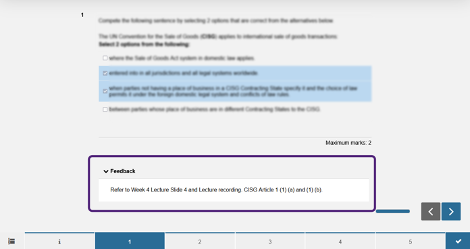Blog post – Redesigning assessment in IBUS3306
This course is the legal component of the undergraduate Bachelor of Business, International Business Major, in the UQ Business School. Students examine transactions in the international marketplace, as well as global commercial laws and national rules, focusing on how these laws can be used to anticipate and manage external risks, costs, and liabilities in the 2023/24 marketplace.
Gary has been redeveloping the course since 2021 to make it relevant for graduates that need to be aware of emerging issues across jurisdictions in a post-COVID world with new and evolving risks related to economic sanctions, regional conflicts, and other complexities.
As the sole coordinator, lecturer, tutor and assessor for the course, which has enrolments of ~180 students from 19 different degree programs, Gary was seeking ways to improve the efficiency of the course’s operations while not compromising on the quality of teaching and assessment.
Working with Dale Hansen of ITaLI’s Digital Assessment team, Inspera Assessment was used to build a range of assessment that was quickly adaptable and improve the efficiency of feedback for a diverse cohort of mostly non-law students often in their final year of study.
Assessment re-design and outcomes
Inspera was used for all assessment in the course which consisted of weekly "knowledge checks” and contextually rich scenario-based exams requiring critical thinking to identify legal risk and make recommendations about managing and mitigating complexity. This choice provided a consistent and convenient experience for students in that they were able to familiarise themselves with the platform early, reducing the likelihood of technology related stress and allowing students to focus on the requirements of the assessment.
The weekly “knowledge checks” were low stakes and proved effective as a reflection mechanism for Gary. He could immediately see the gaps in his students’ knowledge, then modify the next week’s tutorial and “knowledge check” accordingly to revisit and embed foundational knowledge before moving onto more complex concepts that relied upon those foundations. Creating questions in Inspera was easy due to the intuitive interface, and the flexibility to independently modify the assessment tasks without affecting the 'delivery' settings assisted greatly in quickly achieving this level of adaptability.
Another key component of the weekly assessments was the detailed and actionable pre-written feedback that Gary built into the questions as he was creating them. Upon completion of each assessment, students could review this feedback, which pointed to readings and other materials students could use to independently fill their knowledge gaps. For a large and diverse cohort of learners, this had the added benefit of allowing tutorial and consultation time to be used for more in-depth discussions and explanations of concepts rather than reviewing the previous week’s assessment and lecture content.

Students can access their feedback alongside each question when they view their submission.
Students indicated the consolidation of foundational knowledge gained through these low stakes weekly assessments and actionable feedback enabled them to confidently apply that knowledge to factual scenario-based questions and succeed in demonstrating the acuity required for reaching sound conclusions based on critical thinking in the more heavily weighted summative course exams. They also commented on the layout and clear navigation of Inspera which provide an aesthetically pleasing student experience.
Gary has received positive feedback from students, both through SECATs and unsolicited means, with regards to the course and its assessment.
Future plans
When Gary was first approached to redesign this course, the use of generative AI was far less prevalent than it is today. Whilst the inclusion of invigilated exams is an AI-resilient approach that produces credible results, Gary still intends to explore other ways of assessing students. Incorporating AI in the students’ learning environment, but requiring students to remain curious critical thinkers, able to evaluate AI’s output and usefulness in achieving their goals is the next challenge.
If you have any questions regarding this case study, please contact the authors, Dale Hansen and Gary P. Campbell.
Visit the Inspera Assessment page to find information, resources and support.
